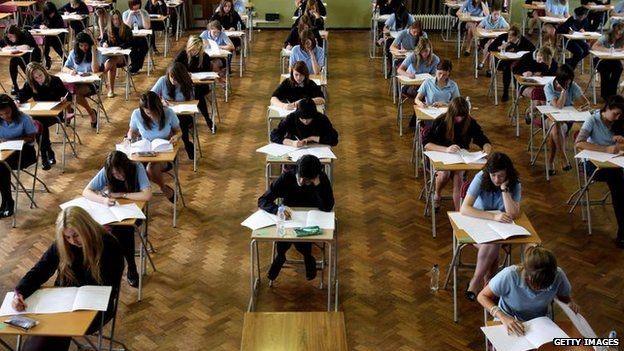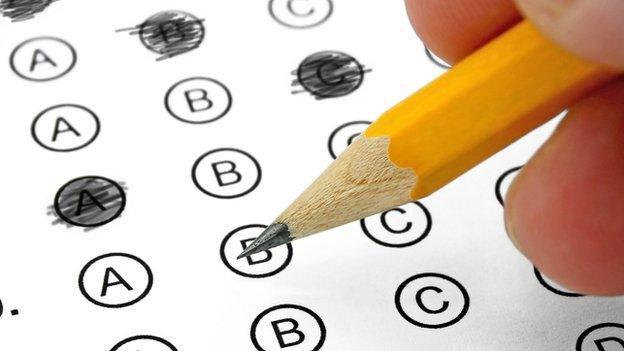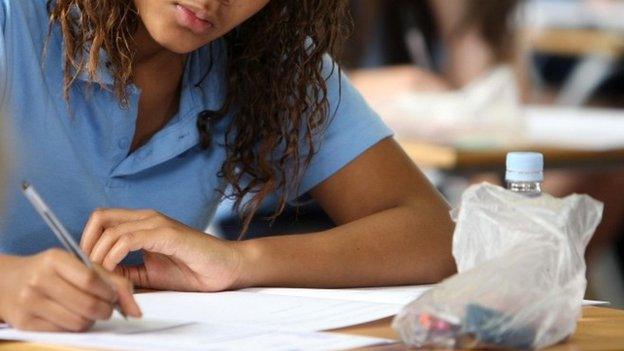GCSEs 2016 - a user's guide
- Published

The results of this year's GCSE exams are released on Thursday
Pupils in England, Wales and Northern Ireland are receiving their GCSE results - just over two weeks after teenagers in Scotland received the results of their equivalent National 4s and 5s.

How many GCSEs have students taken this year?
Entries for all candidates in England, Northern Ireland and Wales are down 0.7% on last year to 5,240,796, according to official figures.
By contrast, in England the overall entry, external for GCSEs in England increased slightly from 4,916,000 in 2015 to 4,929,000 this year.
Early entries (for students in Year 10 or below) fell for the second year running in England to 300,000 - a 13% drop on 2015.
This follows a 32% fall from 504,000 in 2014 to 344,000 in 2015 and reflects government moves to discourage schools from entering pupils early.
But more older students were entered this year, reflecting the raising of the participation age in education to 17 in 2013 and then to 18 last year.
The government is also encouraging older pupils to resit English and maths if they do not achieve good grades (A* to C) in Year 11
This year there were 355,000 GCSE entries for post-Year 11 students, up 26% on last year's figure of 282,000.
By subject, Ofqual noted 2016 increases for Year 11 students in English literature, biology, chemistry, physics, geography, history, science, additional science Spanish and computing.
But entries fell in English and English language, German and French.

Have there been any changes to GCSEs this year?
In England this year's GCSEs will be the last to be marked under the existing system, graded A* to G.
Last September new "more demanding" courses were introduced in English and maths for the current Year 10 - but this change will not have any affect on this year's results as the new courses are linear and will be examined next summer at the end of two years.


There has been an expected fall in the number of pupils sitting GCSEs early
How will GCSEs change next year?
In England students who started GCSE courses last September in maths, English and English literature will be graded 1-9 in these subjects when they get their results in summer 2017.
The new grades will come in for most other GCSEs the following year.
These include biology, chemistry, physics, computer science, languages, religious education, geography, music and history, which will be taught from September 2016, with exams in 2018.
A third wave of 1-9 graded GCSEs will be taught from September 2017 with exams in 2019.
These include psychology, ancient history, business, information and communications technology (ICT) and media studies.
Ofqual has also said that it expects broadly the same proportion of students who currently received a grade C and above under the current system to achieve a grade 4 and above under the new system.
The new courses will include far less coursework, with grades in almost all subjects depending on exams. These courses are designed to be more rigorous with exams taken after two years of study rather than in modules with exams along the way.
Foundation and higher-tier papers for students in different ability ranges will be phased out.

How do GCSEs differ in Wales and Northern Ireland?
A GCSE reform programme , externalis also under way in Wales with new courses from the WJEC, external board taught in Welsh schools from last September in six key subjects.
These are English language, Welsh language, English literature, Welsh literature, mathematics and numeracy and mathematics.
The November 2017 and summer 2017 exams will reflect these new qualifications and the results will no longer be comparable with their equivalents in England, says the Welsh government.
Northern Ireland is also developing new GCSE specifications for first teaching from September 2017 and will retain A*-G grades rather than adopt England's new numeric grading system.
Some schools offer courses from English exam boards alongside those from the Northern Ireland board, CCEA., external

What should I do if I am getting my GCSE results on Thursday?
You may get your results by text, email or in the post, but it's still a good idea to go to your school or college on results day. By doing this, you can get help and advice from your teachers.


Pupils have the option to resit exams in the autumn
Do I have to stay on at school or college?
If you live in England, yes. This summer's GCSE cohort in England (born between 1 September 1999 and 31 August 2000) is the second to have to stay in education or employment with training until 18.
In Scotland, if you turn 16 between 1 March and 30 September, you can leave school after 31 May of that year. If you turn 16 between 1 October and the end of February, you can leave at the start of the Christmas holidays in that school year.
In Wales, you can leave school on the last Friday in June, as long as you will be 16 by the end of that school year's summer holidays.
In Northern Ireland, if you turn 16 during the school year (between 1 September and 1 July), you can leave school after 30 June. If you turn 16 between 2 July and 31 August, you cannot leave school until 30 June the following year.

What can I do if I don't have the grades needed for A-level or vocational courses?
Try not to panic. If you don't get the grades asked for by the sixth-form or college of your choice, approach the staff there and see if they are prepared to be flexible. It's possible they will still give you a place or they might be prepared to take you on for different courses. Alternatively, approach other schools or colleges - you might find they will accept you.

Will the changes affect resits?
Resits will be complicated by the course changes, with the current set of GCSEs in English and maths being phased out. Ofqual has required the boards, external to offer resits in the current English, English and maths exams in November and next summer and in science subjects no later than summer 2018.
For other current GCSE courses, boards will also be allowed to offer a single resit opportunity in the year following the last scheduled sitting.
Students will have to resit all the exams for the qualification and there is an expectation that candidates will be at least 16.


Resits are available in maths and English in November
Can I challenge my results?
If you feel strongly that your grades are wrong and do not reflect your ability, you can ask for a re-mark of your papers. Requests for re-marking can only be done through your school or college. Make sure someone there is dealing with the matter. There is a fee for this service, which is reimbursed only if there is a grade change. The Joint Council for Qualifications has guidelines on the post-results service, external available to schools.

Where can I go for more advice?
You can call the national exam results helpline on 0808 100 8000 or the National Careers Service , externalon 0800 100 900.